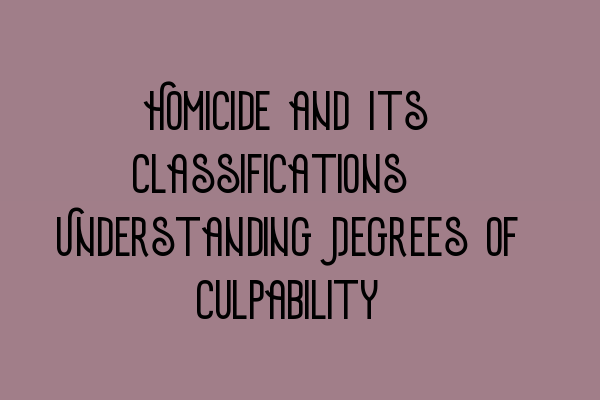Homicide and Its Classifications: Understanding Degrees of Culpability
Homicide is one of the most serious criminal offenses, involving the unlawful killing of another person. It encompasses various degrees of culpability, which can greatly impact the potential penalties and legal consequences for the accused. Understanding these classifications is essential for both legal professionals and the general public.
1. Murder
Murder is the most severe form of homicide and is categorized by the intentional and premeditated killing of another person. It requires the presence of malice aforethought, meaning that the act was committed with the intent to cause death or grievous bodily harm. Murder is a heinous crime, and those convicted may face life imprisonment or even the death penalty.
There are also specific circumstances under which murder may be classified as “first-degree” or “second-degree.” First-degree murder typically involves premeditation and planning, while second-degree murder may arise from a spontaneous and impulsive act.
2. Manslaughter
Manslaughter, the second-degree of homicide, differs from murder in terms of intent and premeditation. It involves the unlawful act of killing another person, but without the malice aforethought required for murder. Manslaughter can be further classified into voluntary and involuntary manslaughter.
Voluntary manslaughter involves the intentional killing of another person; however, it typically occurs in the heat of the moment due to extreme emotions or a sudden provocation. The intent is present, but it is not the result of premeditation as seen in murder cases.
Involuntary manslaughter, on the other hand, occurs when a person unintentionally causes the death of another through negligence or recklessness. This can include cases where a person’s actions or failure to act result in a fatal accident.
3. Infanticide
Infanticide is a specific category of homicide that involves the killing of a newborn child by their mother. It recognizes that women who have recently given birth may experience severe psychological distress, often leading to the tragic act of ending their child’s life. Infanticide is considered a lesser offense compared to murder or manslaughter, and it carries its own legal parameters and penalties.
Conclusion
Understanding the distinctions between different degrees of culpability in homicide cases is crucial for legal professionals, law students, and the general public alike. The severity of the offense and the potential consequences faced by the accused significantly depend on the classification of the crime committed.
If you are interested in learning more about the legal profession, preparing for the SQE exams, or navigating the intricate world of criminal law, check out our related articles:
